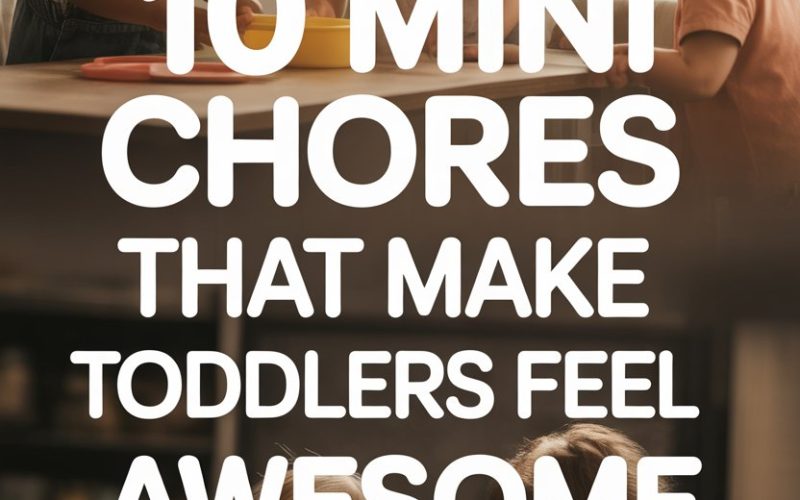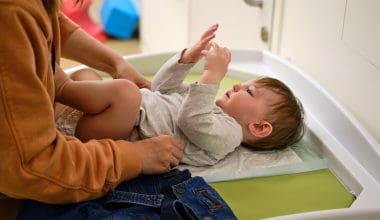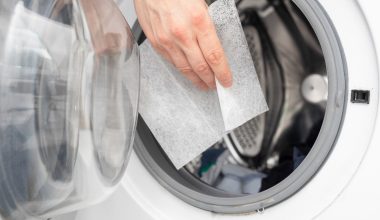Parenting a toddler means living with a pint-sized dictator who demands independence, but also wants you to peel their banana the “right” way.
You’re supposed to raise a confident, skilled human, all while making it to work with matching shoes. Is there a secret to channeling toddler energy into something helpful (besides, you know, hiding the felt tips)?
Turns out, giving them tiny jobs around the house can do wonders for their confidence—and your to-do list.
Small jobs don’t just pass the time. According to child development experts, simple household responsibilities help little ones develop fine motor skills, a sense of agency, and that all-important “I did it!” glow.
No need for Pinterest-worthy chore charts or elaborate reward systems. A sprinkle of encouragement, a dash of patience, and you’re golden.
Here are ten mini chores that make toddlers feel like absolute legends.
1. Watering Plants
Who knew a plastic cup and a thirsty ficus could spark so much pride?
Assigning your tot the task of watering the houseplants (or patio pots) not only keeps the greenery alive, it also teaches your little one about responsibility and patience.
Yes, the floor may get a bit soggy. And yes, plants might receive more of a bath than a drink. But nothing beats the look on a toddler’s face as they solemnly declare, “Plants need me.”
According to a University of Illinois Extension project, gardening activities help children learn about caring for living things and develop empathy.
If your child is especially zealous, consider investing in a sturdy watering can designed for small hands. Your ficus will thank you (eventually).
2. Sorting Laundry
Toddlers are born sorters. Give them a basket of mismatched socks, and suddenly you’ve got a game show host and contestant all in one.
Matching socks, dividing shirts from pants, or simply putting their own pants in a hamper does wonders for those budding categorization skills.
It’s true, you might discover a shoe in the T-shirt pile or a stuffed toy in with Dad’s work shirts. But trust that every pair found and every shirt folded with four extra creases is a victory dance waiting to happen.
Research from the University of Melbourne suggests that chores like laundry sorting help children build planning skills and a sense of contribution. Toss in a bit of praise and maybe a silly sock puppet, and you’ve got a chore they’ll beg to repeat.
3. Feeding the Pet
For households blessed with a dog, cat, or even a goldfish, letting your toddler scoop kibble or sprinkle flakes gives them a sense of purpose. Plus, the pet gets fed (eventually), and your little one learns about routine and care.
Supervision is key—nobody wants a Labrador who’s eaten three breakfasts because someone got enthusiastic. But even scooping a spoonful or helping pour water in the bowl sparks pride.
It’s a win for empathy, coordination, and, if you’re lucky, a slightly cleaner floor (emphasis on slightly).
The Royal Children’s Hospital Melbourne notes that caring for pets helps kids learn responsibility and empathy—two skills parents wish they could bottle up and sell.
4. Wiping the Table
Hand your toddler a damp cloth after meals and watch the transformation from messy eater to proud cleaner-upper. Will the table end up streak-free? Doubtful. Will you still find raisins from breakfast at dinnertime? Absolutely.
But for a toddler, wiping the table is all about cause and effect: “Look, Mum, I made it shiny!”
Encourage the effort, not the perfection. Try singing a silly clean-up song or racing to finish the job before the timer buzzes. You’re building positive habits, one smear at a time.
Pediatric occupational therapists, like those at The OT Toolbox, recommend simple cleaning tasks to boost hand strength and coordination.
5. Putting Away Toys
Ask any parent: stepping on a rogue LEGO at midnight is a special kind of pain. Teach your toddler to pick up their own toys, and you’re not just saving your feet—you’re teaching responsibility and order (at least until the next play session).
Make it a game: race to fill the bin, sing the “clean up” song, or sort by colour or size. Some parents swear by toy baskets with pictures on them to help little ones know where things belong.
Practical? Yes. Life-changing? For your toes, absolutely.
According to Zero to Three, giving toddlers simple, consistent responsibilities like toy tidying encourages independence and decision-making—without resorting to a nightly bribe.
6. Setting Napkins and Cutlery
Toddlers love being included in “grown-up” jobs, and laying out napkins and (non-sharp!) cutlery before meals lets them feel essential.
Don’t be surprised if the spoons end up where the forks should be, or if you’re suddenly eating off a Peppa Pig plate at a dinner party.
The thrill is in the participation, not the perfection. Offer gentle reminders (“Forks on the left, spoons on the right!”) and plenty of praise.
Even if the table looks like a Mad Hatter’s tea party, your child will stand back with that unmistakable “I helped!” grin.
Early childhood experts from Raising Children Network say mealtime chores help children learn about routines, sharing, and teamwork. Fancy table settings optional.
7. Dusting Low Surfaces
Tiny hands, meet tiny dusters. Pass your toddler a feather duster or a microfibre cloth and send them on a mission to tackle the coffee table, bottom shelves, or baseboards.
The idea isn’t to deep-clean (please don’t check under the sofa), but to let your child feel like they’re making the house sparkle.
Apparently, some toddlers become obsessed with dusting—possibly because it feels like magic: wave the cloth, the dust disappears.
The trick is to keep it simple and safe—no climbing on stools to reach the fancy vases.
According to paediatricians at Cleveland Clinic, age-appropriate chores like dusting promote motor skills and responsibility. Plus, you might discover a long-lost toy in the process.
8. Putting Dirty Clothes in the Hamper
Laundry day with a toddler typically means socks in every room, but giving them the job of popping dirty clothes in the hamper is surprisingly satisfying.
It feels like playing basketball, minus the need for any actual aim.
You can turn this into a simple game: “Can you toss your shirt in the basket?” With a little hoopla (pun intended), your child learns about routines and consequences.
Bonus points if you occasionally “miss” so your toddler can show you how it’s done.
Early years experts from Verywell Family say tasks like these help build independence and a sense of accomplishment—no gold medal required.
9. Carrying Groceries (the Light Ones!)
From the outside, carrying a loaf of bread or a box of tissues from the car to the kitchen doesn’t look like much.
In toddler terms, though, you’ve just handed over a hero’s quest. Suddenly, they’re a “helper,” trusted with an important cargo.
Let your toddler proudly parade through the house with a bag of apples or a cereal box, and you’ll be rewarded with that beaming smile reserved for Olympic victories and successful toilet trips.
Watch out for the occasional “snack detour”—a banana might disappear en route.
Research highlighted by Parents Magazine shows that giving children meaningful responsibilities—even small ones—boosts confidence and strengthens family bonds. Just maybe keep the eggs in your own hands.
10. Helping Make the Bed
Bed-making with a toddler is less about crisp hospital corners and more about enthusiastic pillow flinging. Still, smoothing the duvet, placing their favourite stuffed animal at the top, or tugging a sheet into place counts as a job well done.
Make it a ritual—put on some music, create a routine, and celebrate the final product (wrinkles and all). Before you know it, you’ll find them “making” their bed without prompting, just to show off.
According to the American Academy of Pediatrics, involving children in daily household routines fosters a sense of belonging and capability.
And frankly, what parent doesn’t want a kid who takes pride in their own little space?
Raising a Mini Helper, One Tiny Task at a Time
Allowing toddlers to pitch in isn’t about creating a spotless house (if only!). It’s about raising confident, capable kids who know they have an important place in the family.
A little mess, the occasional puddle, and a missing sock or two are a small price to pay for that proud, gap-toothed grin.
Tonight, hand your little one a small job—just one. Watch them puff up with pride at being trusted, needed, and “just like Mummy or Daddy.”
The result? Maybe a cleaner living room. Almost certainly a happier, more confident child. And possibly, a moment or two to drink your tea while it’s still hot.
Now, there’s a win for everyone.





